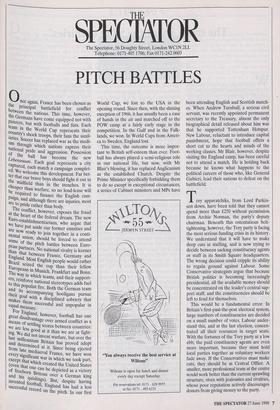SPECTATOR
The Spectator, 56 Doughty Street, London WC1N 2LL Telephone: 0171-405 1706; Fax 0171-242 0603
PITCH BATTLES
nee again, France has been chosen as the principal battlefield for conflict between the nations. This time, however, the Germans have come equipped not with panzers, but with footballs and fists. Each team in the World Cup represents thetr country's shock troops, their fans the auxil- iaries. Soccer has replaced war as the medi- um through which nations express their national pride and aggression. Possession of the ball has become the new Lebensraum. Each goal represents a city captured, each match a campaign complet- ed. We welcome this development. Far bet- ter that our brave boys should fight it out in the midfield than in the trenches. It is cheaper than warfare, so no lend-lease will be required to finance the English cam- paign, and although there are injuries, most are to pride rather than body. The conflict, however, exposes the fraud at the heart of the federal dream. The new Euro-establishmentarians, who argue that we have put aside our former enmities and are now ready to join together in a conti- nental union, should be forced to attend some of the pitch battles between Euro- pean partners. No national rivalry is keener than that between France, Germany and England. Most English people would rather Brazil seized the cup than their fellow Europeans in Munich, Frankfurt and Bonn. The way in which teams, and their support- ers, reinforce national stereotypes adds fuel to this Populist fire. Both the German team and its accompanying hooligans pursue their goal with a disciplined sobriety that makes them successful and unpopular in equal measure. For England, however, football has one great disadvantage over armed conflict as a means of settling scores between countries: w e are less good at it than we are at fight- ing. We did not invent warfare, but over the last millennium Britain has proved adept and determined at it. Since being ejected from late mediaeval France, we have won every significant war in which we took part, except that which created the United States (even that one can be depicted as a victory of freeborn Britons over a German king and his quislings). But, despite having invented football, England has had a less successful record on the pitch. In our first World Cup, we lost to the USA in the opening round. Since then, with the shining exception of 1966, it has usually been a case of hands in the air and marched off to the POW camp at a fairly early stage in the competition. In the Gulf and in the Falk- lands, we won. In World Cups from Ameri- ca to Sweden, England lost.
This time, the outcome is more impor- tant to British self-esteem than ever. Foot- ball has always played a semi-religious role in our national life, but now, with Mr Blair's blessing, it has replaced Anglicanism as the established Church. Despite the Prime Minister specifically forbidding them to do so except in exceptional circustances, a series of Cabinet ministers and MPs have been attending English and Scottish match- es. When Andrew Turnbull, a serious civil servant, was recently appointed permanent secretary to the Treasury, almost the only biographical detail released about him was that he supported Tottenham Hotspur. New Labour, reluctant to introduce capital punishment, hope that football offers a short cut to the hearts and minds of the working classes. Mr Blair, however, despite visiting the England camp, has been careful not to attend a match. He is holding back because he knows what happens to the political careers of those who, like General Galtieri, lead their nations to defeat on the battlefield.
Tory apparatchiks, from Lord Parkin- son down, have been told that they cannot spend more than £250 without permission from Archie Norman, the party's deputy chairman. Beneath this ostentatious belt- tightening, however, the Tory party is facing the most serious funding crisis in its history. We understand that it will have to make deep cuts in staffing, and is now trying to decide between sacking constituency agents or staff in its Smith Square headquarters. The wrong decision could cripple its ability to regain ground against Labour. Some Conservative strategists argue that because British politics is becoming increasingly presidential, all the available money should be concentrated on the leader's central sup- port staff, and the constituencies should be left to fend for themselves.
This would be a fundamental error. In Britain's first-past-the-post electoral system, large numbers of constituencies are decided on a small number of votes. Labour under- stand this, and at the last election, concen- trated all their resources in target seats. With the fortunes of the Tory party at a low ebb, the paid constituency agents are even more important, because they must hold local parties together as voluntary workers fade away. If the Conservatives must make cuts, they should be at Central Office. A smaller, more professional team at the centre would work better than the current sprawling structure, riven with jealousies and rivalries, whose poor reputation actively discourages donors from giving money to the party.


























































 Previous page
Previous page